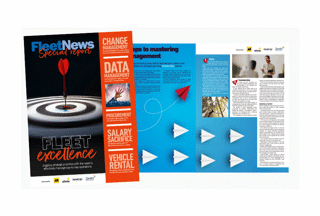
Stress and tiredness are among the major contributors to a driver’s lack of mental wellbeing and these can be caused by factors both inside and outside work.
It is vital that any mental wellbeing problems are identified so an employee can get the help they need to manage their symptoms and reduce the risk to themselves and other road users.
A sign that a driver is having an issue could be a change in the way they behave around people or carry out their job.
At a Fleet Live 2019 fleet operations seminar (2pm Tuesday 8), Andy Neale, director of driver risk management company NFE Group, will outline how fleet operators can identify the signs of poor wellbeing and implement a supportive culture at work.
“If I came to work with a broken leg, you would see the plaster,” he said.
“If I came to work stressed, there may be no physical signs.”
Stress – together with fatigue – are major factors in the mental wellbeing of a driver.
And, if a driver is stressed or tired, either can have a significant effect on their performance. Stress, for example, means a driver will take more risks.
“There is a whole range of costs to the operation caused by poor driving performance,” added Neale.
“There is the bent metal costs, bumps and scrapes, damaged wing mirrors and increased insurance costs, while research in other industries has shown that tired and stressed drivers use far more fuel.
"There is also a human cost, which will not show up as obviously on an organisation’s balance sheet.”
Joining Neale will be Andrew Brown, director of corporate partnerships at Campaign Against Living Miserably (CALM).
He will put into perspective the scale of the problem in the UK, why fleets should take this wellbeing issue seriously and what they can do to address it in their own businesses.
Join us at Fleet Live
Fleet Live will give the fleet management community and decision-makers the chance to face future challenges and opportunities together with two days of learning, sharing and networking on October 8-9 at the NEC in Birmingham.
The event is complementary for fleet professionals and delegates can sign up for their ticket at www.fleet-live.co.uk/online-registration.
Fleet operations seminars: sessions and speakers overview
When: Tuesday October 8
11.00 Great ideas for a safer fleet
Caroline Sandall, ACFO national chair
Dr Jim Golby, ADT (Applied Driving Techniques) director of research and customer experience
John Newman, Jacobs head of health and safety
This session will give a case study from a fleet safety pioneer on the steps it took to improve safety and reduce risk.
Those attending will come away with practical solutions they can implement in their own businesses.
Sponsored by: KORE
11.00 Driver recruitment and retention in commercial fleets
Martin Colloff, Hermes UK head of client and network distribution
Kieran Smith, Driver Require chief executive
Kieran Smith will discuss driver shortages in the industry, how the industry can resolve the issue and how Brexit could exacerbate shortages and bring the UK to a crisis point.
Martin Colloff, of Hermes UK, will talk about the challenges facing recruiting and retaining drivers in the commercial fleet industry.
This will include an overview of Hermes’ heavy goods vehicle recruitment initiative.
This session will also explore how fleet can persuade more women to consider professional driving as a career.
14.00 How to use your data to improve your fleet efficiency
Rory Morgan, Iron Mountain head of fleet
Caroline Sandall, ACFO national chair Make big data work for your fleet
The industry must change from a rear-view mirror perspective to using data to predict the future and be more pre-emptive.
This session will explore how to bring together multiple sources of fleet data from telematics, fuel cards, connected cars and licence checks to help reduce costs and improve efficiency.
It will also explore how fleets can use e-learning to store driver data and create safety profiles, as well as how fleets can use technology to manage fuel and reassess vehicle utilisation and productivity.
Sponsored by: Jaama
14.00 Driver wellbeing: identify the signs of stress and fatigue and create a culture of support
Andrew Brown, CALM corporate partnerships director
Andy Neale, director of driver risk management company NFE Group
Andrew Brown from CALM (the Campaign Against Living Miserably) will put into perspective the scale of the problem of suicide in the UK, why fleets should take this issue seriously and what they can do to address it.
There will also be a case study from Andy Neale, of the NFE Group, on how to implement a supportive culture at work.
When: Wednesday October 9
11.00 Collaborative supplier partnerships that add value
James Davis, Cox Automotive UK customer strategy and insight director (Commercial Vehicles)
Steve Duffy, Network Rail senior delivery manager
Matt Cranny, ARI Fleet UK operations director
Phil Corbett, Travis Perkins procurement manager
This session will offer best practice on the tender process and how to remain collaborative with suppliers when there is pressure on the business to change suppliers to maintain the best value for money.
It will also explore how you can look for continuous improvement over a long-term supplier relationship.
11.00 Fleet utilisation and minimising vehicle downtime
Mark Woodworth, Speedy Hire head of transport
Pressure on fleet budgets and a desire to optimise vehicle utilisation has led to an increasing focus on making vehicles work longer, harder and smarter.
This session will focus on an expert case study from an award-winning fleet that has tackled fleet utilisation and vehicle downtime to deliver tangible improvements for the company.
Sponsored by: Jaama
14.00 Telematics: How to convince the board to invest
Michal Szuminski, The First Mile transport manager
Peter Kelly, Elis Group compliance and fleet manager
Telematics is an established technology that can offer improvements for efficiency and safety and can save fleets money in fuel and insurance payments.
The stumbling block in introducing the technology, which is now available at a variety of price points, is getting buy-in from the board.
This session will cover how a fleet manager can put the case together that shows the benefits of telematics are worth the investment and management focus.
What are the biggest obstacles and what are the benefits? How should you present your case and get a telematics initiative through from concept to delivery?
Sponsored by: Verizon Connect
14.00 Protecting vulnerable road users
Ross Moorlock, Brake business development director
Protecting vulnerable road users and minimising the chance that their drivers will be involved in a crash are two of the most important steps fleet managers can take towards raising road safety standards.
Just 52% of organisations currently have driver handbooks that include guidance on vulnerable road users.
Brake’s Ross Moorlock will present a session on the responsibilities fleet managers should be aware of and what they can do in their business to raise awareness of the issues among their staff.




















Login to comment
Comments
No comments have been made yet.